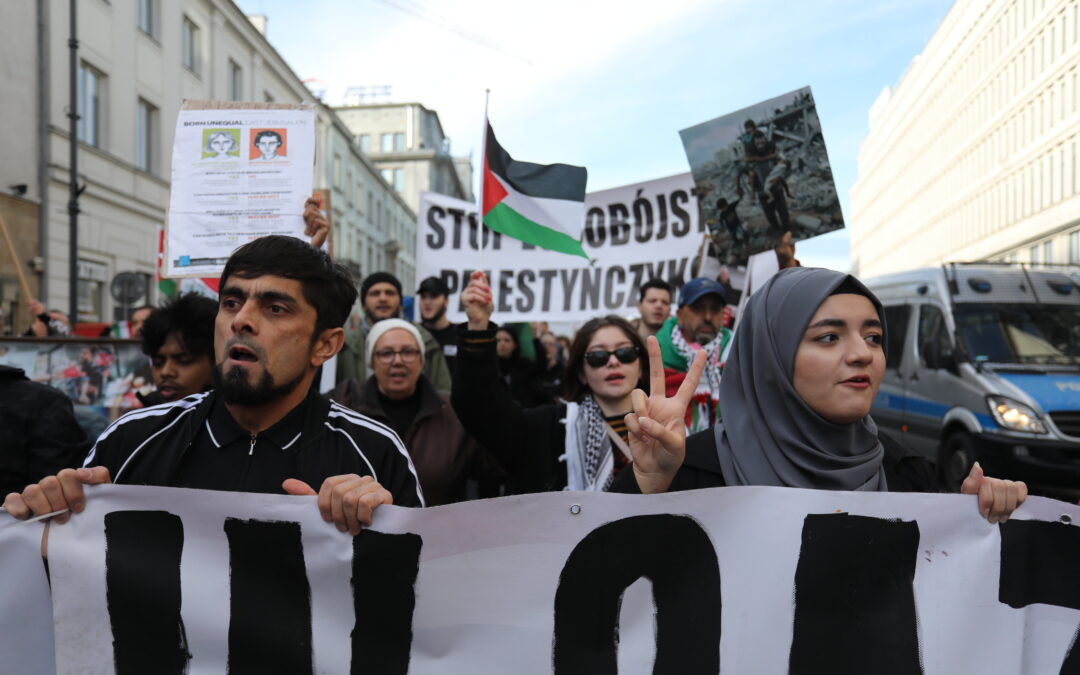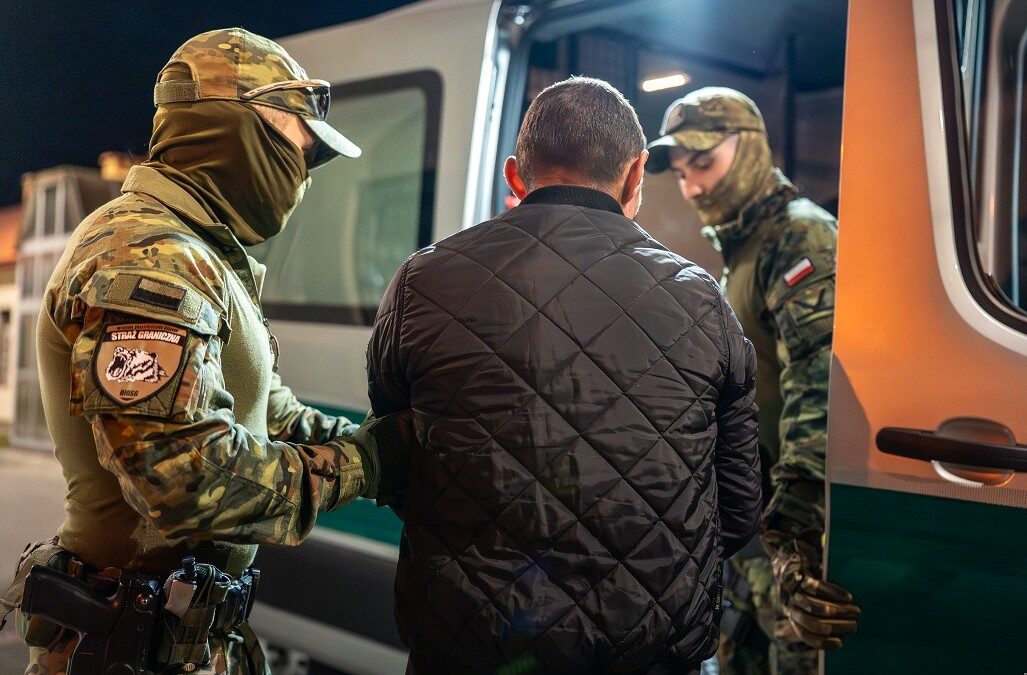Warsaw’s mayor has banned a pro-Palestinian demonstration that would have finished outside the Israeli embassy. He cited security concerns and pointed to an antisemitic sign that appeared at a previous march in support of Palestine in the city.
The organisers of the march, who expected around 2,000 people to attend, have exercised their right to appeal to a court against the mayor’s decision. Given that the event is planned for Saturday, any ruling will have to be issued quickly.
Prezydent Miasta Stołecznego Warszawy @trzaskowski_ zakazuje sobotniej (18.11.23) demonstracji propalestyńskiej przemarszu obok ambasady Izraela. 🇮🇱🇵🇸 pic.twitter.com/q3e9XcDfvi
— Patryk Kulpok (@PKulpok) November 14, 2023
Warsaw has already allowed a number of demonstrations in support of both Palestine and Israel to take place since the Hamas attack on 7 October that set off a renewed conflict in the region. Similar events have also been held in other Polish cities. All have so far passed peacefully.
This Saturday’s protest was due to be held under the slogan “Not one more bomb – free Palestine”. In accordance with regulations, the organisers of the event applied to city hall to register it.
The march was meant to start from Zbawiciela Square, then the route was to lead along Nowowiejska and Ludwika Krzywickiego Streets, finishing in front of the Israeli embassy on Krzywickiego Street.
Yesterday, however, the municipal authorities issued a ban on the gathering. It was signed on behalf of mayor Rafał Trzaskowski by Jarosław Misztal, deputy director of the city’s security bureau.
A spokeswoman for city hall, Monika Beuth, told newspaper Gazeta Wyborcza that the decision was unrelated to the slogan of the march and was “purely about security”
She pointed out that the demonstration was supposed to end in front of the Israeli embassy, on the narrow Krzywicki Street, where 2,000 people would be relatively cramped and the police could have difficulties guaranteeing the security of both participants and the diplomatic facility.
The Medical University of Warsaw has suspended a Norwegian student who was pictured at a recent pro-Palestine march in the Polish capital holding a banner featuring the Israeli flag being thrown in a bin alongside the words “Keep the world clean” https://t.co/qYC5HQpTef
— Notes from Poland 🇵🇱 (@notesfrompoland) October 31, 2023
An assessment by the deputy chief of the capital’s police force, Tomasz Znajdek, also raised concern about the event, saying that it could be used as an opportunity for some to take “radical actions increasing the terrorist threat”.
“It cannot be ruled out that, under the influence of negative emotions, [participants] may seek confrontation with embassy staff,…throw dangerous objects into the embassy premises, as well as attempt forcible entry,” he wrote in a letter to city hall cited by Gazeta Wyborcza.
Following Znajdek’s assessment, the authorities asked the organisers to change the route of the march. In response, it was shortened to the intersection of Filtrowa and Krzywickiego Streets. But that change was deemed insufficient.
“This is basically the same place as before, still right next to the Israeli embassy,” explained Beuth. City hall again requested an opinion from the police and, after receiving another negative assessment, refused permission for the march.
Two demonstrations – one in support of Israel, the other Palestine – took place in Warsaw.
"We will defeat the Nazis of Hamas just as the world defeated Nazi Germany," declared Israeli ambassador @YacovLivne in front of the Warsaw Ghetto Uprising monument https://t.co/RVehmNDLNF
— Notes from Poland 🇵🇱 (@notesfrompoland) October 30, 2023
In their document announcing the decision, the officials cited the police assessment and pointed to the context of “the current unstable geopolitical situation, in particular the ongoing armed conflicts in Ukraine and the Middle East”. This “poses a serious threat” and necessitates “far-reaching precautions”.
The authorities also noted the incident at a pro-Palestine march in Warsaw last month during which one participant – a Norwegian student – held a banner featuring the Israeli flag being thrown in a bin alongside the words “Keep the world clean”. They called this an example of the “glorification of aggression”.
“In a city like Warsaw, which was particularly affected by the extermination and persecution of Jews during World War II,… there can be no place for hatred and antisemitism or any manifestation thereof,” reads the city’s decision to ban this Saturday’s march.
It expressed concern that “the planned gathering may lose the attribute of a peaceful gathering, and its deliberate termination in front of the Israeli embassy must raise serious concerns about security”.
Hundreds joined a pro-Palestinian demonstration in the Polish city of Kraków last night.
Participants held signs saying “End the Holocaust of Palestinians" and "Gaza Ghetto".
They chanted "From the river to the sea, Palestine will be free" https://t.co/AZ7QdY2nAN
— Notes from Poland 🇵🇱 (@notesfrompoland) October 14, 2023
In a post on Facebook, the organisers of the march shared the mayor’s decision but added that “solidarity with Palestine cannot be banned” and declared “see you this Saturday at 1 p.m. on Zbawiciela Square”.
Beuth told Gazeta Wybrocza that the organisers had exercised their right to appeal against the city’s decision, which they argue violates the constitutional values of freedom of speech and assembly. A court will now further decide the fate of the event.
Mayor of Warsaw @trzaskowski_ issued a decision to ban an anti-war protest 'Not one more bomb' in solidarity w/ Palestine citing concerns over public security. We reiterate that under Intl #HumanRights law restrictions on protests are only permissible in v. limited instances. 🧵 pic.twitter.com/f70RY5PnAL
— ARTICLE 19 Europe & Central Asia (@article19europe) November 15, 2023

Notes from Poland is run by a small editorial team and published by an independent, non-profit foundation that is funded through donations from our readers. We cannot do what we do without your support.
Main image credit: Slawomir Kaminski / Agencja Wyborcza.pl

Agata Pyka is a former assistant editor at Notes from Poland. She specialises in Central and Eastern European affairs, cybersecurity, and investigative reporting. She holds a master’s degree in political communication from the University of Amsterdam, and her work has appeared in Euractiv, the Balkan Investigative Reporting Network (BIRN), and The European Correspondent, among others.



















